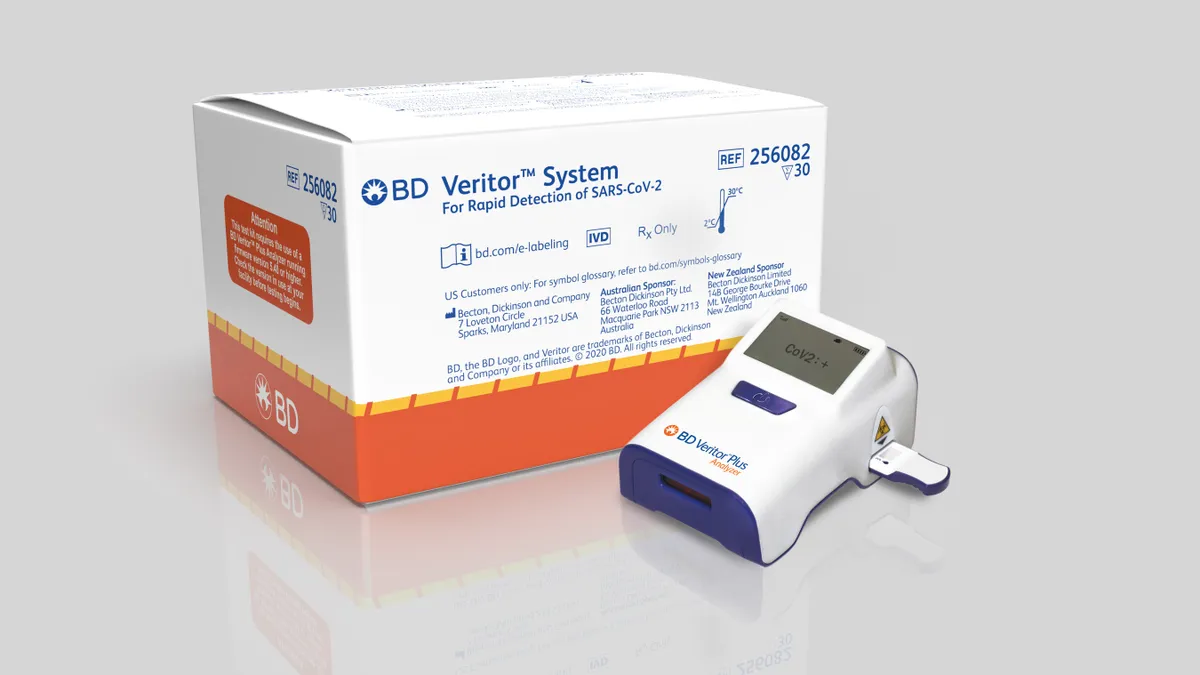A peer-reviewed study funded by BD published in the journal Clinical Infectious Diseases suggests that its Veritor antigen test outperformed a PCR test in detecting people contagious and with symptoms of COVID-19.
The data adds to a debate about faster and cheaper antigen tests and how they should be used when compared to lab-based PCR tests, more sensitive and long considered the gold standard of detecting the virus.
The study of 251 specimens compared BD's antigen diagnostic against Quidel's Lyra PCR Assay, and concluded that point-of-care antigen tests provide a "better test to identify individuals who are likely to be shedding infectious virus and therefore have potential to transmit SARS-CoV-2."
"The antigen test demonstrated a higher positive predictive value (90%) than rt-PCR (70%) when compared to culture-positive results," the authors wrote.
However, FDA has warned that while antigen tests are "very specific for COVID-19" they are not as sensitive as molecular PCR tests.
"This means that there is a higher chance of false negatives than with many molecular tests. Positive results from antigen tests, while generally highly accurate, may be subject to false positive results especially in areas where there are fewer infections," according to FDA.
Proponents of rapid point-of-care antigen tests contend they are the better platforms for mass testing compared to molecular diagnostics due to their relative speed, low cost, scalability, and abilities to detect infectious individuals.
"All diagnostic test technologies have strengths and weaknesses," according to Charles Cooper, BD's vice president of medical affairs and co-author of the study. In particular, Cooper argues that rapid POC antigen tests have the potential to "significantly change the public health interventions needed to minimize the spread of COVID-19."
Michael Mina, a professor of epidemiology at Harvard's school of public health who has been pushing for more widespread use of antigen tests, said the latest study is an important addition to a growing body of evidence demonstrating that antigen tests are "far superior" than PCR tests in identifying those people that are likely to be shedding infectious virus."
Still, Cooper acknowledged that all tests have a false positive rate and a false negative rate. "The fact that they exist at some level doesn't all by itself make it a problem," he added.
In that regard, the Wall Street Journal reported in September that BD was investigating reports of false positive coronavirus test results in U.S. nursing homes run on its portable point-of-care Veritor Plus systems. Cooper said the company conducted an "extremely aggressive" investigation into the 11,000 or so nursing homes that operate Veritor systems.
Cooper insisted that "the number of reports of false positives were very small," but would not quantify that finding.
Following its investigation, BD provided nursing homes with educational materials and videos to help ensure the users, many of whom did not have experience with diagnostics, followed the instructions for use, according to Cooper.
Asymptomatic question mark
An important question regarding rapid antigen tests is how they perform on asymptomatic patients, given estimates that between 30% and 60% of COVID-19 cases are transmitted from people carrying the virus without any symptoms. Earlier this month, a study published in JAMA found at least 50% of infections are estimated to have originated from exposure to asymptomatic individuals.
The ability to effectively screen asymptomatic people is critical to performing mass screening, but recent studies on antigen tests have cast doubt on their efficacy.
A University of Arizona study involving Quidel's antigen test, as reported in November by The New York Times, detected only 32% of the positive cases among those with no symptoms identified by a PCR test. In addition, a new CDC study compared PCR to Abbott's rapid point-of-care BinaxNOW antigen test, which had a 35.8% sensitivity when used to analyze samples taken from asymptomatic individuals.
Still, the CDC study also provided evidence that BinaxNOW catches most infectious cases. In a subset of asymptomatic patients likely to be infectious, the sensitivity was 78.6%.
Abbott in a written statement said the CDC study "demonstrates that BinaxNOW is 92.6% effective at identifying infectious people who are symptomatic and 78.6% when they are asymptomatic." Separately, the company says it is in the process of pursuing an EUA with an asymptomatic indication for BinaxNOW.
In the meantime, Abbott on Tuesday announced that its antigen-based Panbio COVID-19 Ag Rapid Test Device, which is not available in the U.S., received CE Mark including a label update with clinical data on asymptomatic individuals enabling "mass testing of people who do not currently present symptoms."
Cooper emphasized that BD's study focused on symptomatic patients, noting "that's where our intended use is" based on the initial EUA the company received from FDA. "We can't speak to how Veritor would perform in patients who are asymptomatic. We don't have that data," Cooper said.
Asked to comment on BD's study, The Rockefeller Foundation said it does not take a stance on particular manufacturers and tests. However, a spokesperson said "it is critical that tests turn around results quickly to stop the chain of transmission."
At the same time, the Rockefeller Foundation spokesperson noted it has signed a memorandum of understanding with HHS that delivered 140,000 Abbott BinaxNOW tests to six K-12 testing pilot partners in Rhode Island as well as Tulsa, New Orleans, Louisville, Los Angeles, and Washington, DC.
Nonetheless, FDA is allowing antigen and molecular diagnostic tests to be used "off label" in testing asymptomatic patients. However, Hologic CEO Stephen MacMillan said earlier this month at the J.P. Morgan healthcare conference that he believes his company's "on label" PCR tests are best positioned for wider scale asymptomatic testing of populations.
"To get back to normal activities, it is going to be about screening asymptomatic people. We have a label for asymptomatic. And quite frankly, most tests today are being used off label," MacMillan said.
Yet, Mina points out that "off-label doesn't mean not appropriate, it just means companies didn't submit an [EUA] application for that particular use." On the contrary, he makes the case that rapid, low-cost antigen tests are best suited for asymptomatic COVID-19 testing.
"They work as well in asymptomatics as they do in symptomatics, you just have to know how to evaluate them," Mina added. "I am extremely concerned that scientists will continue to unfortunately evaluate these [antigen tests] wrong."




















